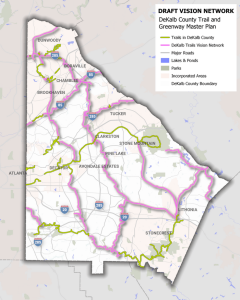By the Atlanta BeltLine Partnership
On March 15, Mayor Keisha Lance Bottoms announced that the City of Atlanta has approved funding to complete the Atlanta BeltLine Multi-Use Trail Special Service District. The Atlanta City Council approved legislation creating a Special Service District (SSD) that will provide approximately $100 million towards completing the Atlanta BeltLine’s 22-mile multi-use trail loop. Passage of the SSD unlocks an additional $100 million in philanthropic contributions, as well as an anticipated $50 million in grants and other sources. The legislation also compliments $100 million from the BeltLine Tax Allocation District (TAD) for trail construction and other initiatives.
“The Atlanta BeltLine has offered tremendous benefits for businesses and property owners along its completed trails,” said Mayor Bottoms. “The SSD will help give communities throughout the city the opportunity to enjoy the benefits associated with the closing of the loop.”
The Atlanta BeltLine has proven to be an economic driver and can play a significant role in the city’s growth and economic recovery from the pandemic. Without additional funding from the SSD or another innovative funding source, the trail loop would not likely be delivered by 2030 and would not spur the expected affordable housing, economic development, job creation, and connectivity outlined in the BeltLine vision.
The SSD is a targeted tax district where commercial and multi-family property owners pay slightly more in property taxes to fund improvements from which they will benefit
The new funding will enable $45 million in additional affordable housing funds, $12 million in additional small business support, and up to $150 million in construction funds targeted towards minority-owned contractors. Completion of the trail corridor is expected to deliver a total economic impact of $10 billion and nearly 50,000 permanent jobs for the City of Atlanta.
Over the last few months, Atlanta BeltLine, Inc. (ABI) and the Atlanta BeltLine Partnership (ABP) hosted six public meetings featuring the SSD and presented at several more to solicit feedback. Thousands of letters, phone calls, and emails were sent to property owners and small businesses along the corridor. Based on comments and concerns from the public, the following changes were made to the legislation:
- Atlanta BeltLine, Inc. (ABI) and the Atlanta BeltLine Partnership (ABP) will partner alongside community organizations, Community Improvement Districts, as well as with neighborhood and business associations to advocate for infrastructure improvements around connectivity, wayfinding and public safety within the overlay and in adjacent neighborhoods;
- ABI will form a stakeholder advisory board providing an additional layer of oversight and consisting of community stakeholders from each BeltLine Subarea, including commercial property owners, small business operators, multifamily property owners, and multifamily rental property residents.
- Two funding amounts will be revised: from $50 million to $45 million as relates to affordable housing, and from $7 million to $12 million as relates to small business support.
- Every two years, the Community Development Human Services Committee will ask the City Auditor to conduct a review of the SSD’s financials.
- Language was amended to ensure the funds are for the sole use of trail acquisition, design, and construction.
“Our ABI team is thankful to Mayor Bottoms and the Atlanta City Council for their leadership on the SSD and support of the Atlanta BeltLine,” said Clyde Higgs, CEO of Atlanta BeltLine, Inc. “A completed Atlanta BeltLine loop is a pathway to greater equity and long-term mobility benefits for residents, business owners, and property owners throughout the city. We look forward to deploying all the resources at our disposal to ensure all are able to stay in place and thrive.”
Following the passage of the legislation, the process begins to issue bonds for ABI to start incorporating funds into the budget. The SSD will appear on property tax bills in fall 2021. ABI’s economic development team will work with individual businesses as well as business associations and Community Improvement Districts to build a plan to address their needs through a comprehensive economic development plan; the housing team will outline where and how the additional $45 million will be deployed; and multiple departments will explore the next steps in procuring minority-owned firms as construction projects advance. ABP will solidify discussions with the philanthropic community.
“Our board, staff, and supporters sincerely appreciate Mayor Bottoms and the Atlanta City Council for their leadership in advancing the Atlanta BeltLine vision,” said Atlanta BeltLine Partnership Executive Director Rob Brawner. “We look forward to continuing to work with donors and partners to fully connect our city and ensure BeltLine residents can live, work, and thrive in their communities.”
“All of us want to be a part of the economic development in communities, to work together to build up our neighborhoods and our city,” said Moses Carroll, owner of FitSquad Studios in southwest Atlanta along the future Southside Trail. “Getting the BeltLine completed will change the game for small business owners. It starts with getting what we need as small businesses and the SSD is going to help us with that.”More information is available at www.beltline.org/ssd. Community engagement will continue throughout the process with all meetings posted at www.beltline.org/meetings.









Comments are closed.